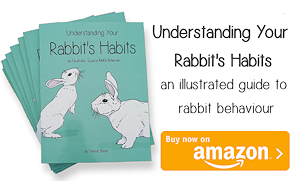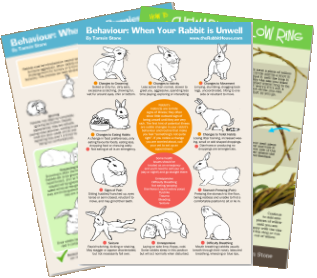Rabbit Hutch/cage Size Guide
Rabbits need somewhere to eat, sleep, hide, and go to the toilet, plus room to hop, run, play, jump, and dig. To provide enough space for all this, the minimum recommended size for the living space, e.g. hutch or cage, is 12 square feet (1.1 square meters), for example 6'x2' (1.8mx0.6m), with the addition of a larger area (32 sq. ft.) for exercise. This is just the minimum though; try to give your rabbit as much space as you can.

Living Space - Minimum 12 sq. ft
Your rabbit's living space should include an enclosed sleeping area, space for a litter tray and feed/water bowls and room to move about and have a few toys. It is essential that your rabbit has the room to stretch in all directions. A living space that's too small can affect your rabbit's health - causing spine problems, muscle wastage and obesity.
Rabbit Hutch Width

A relaxed rabbit will fully stretch out when resting, so your rabbit hutch/cage should be wide enough to allow you rabbit to lie with its legs stretched. This also allows for plenty of room to turn around.
A minimum width of 2' (60cm) is recommended for small to medium sized rabbits and 3' (90cm) for large to giant breeds.
Rabbit Hutch Length
The hutch should be long enough for your rabbit to take at least 3-4 hops without bumping its nose on the end. A medium sized rabbit covers about 18" (45cm) with each hop - see me measuring/photographing my rabbit Scamp hoping here.

Keep in mind the total floor area too, if your hutch is 2' wide, the length would need to need to be 6' to make 12 sq. ft. total.
Rabbit Hutch Height

Rabbits stand up on their back legs to check their environment is safe, and your rabbit's hutch/cage should be tall enough to allow this without your rabbit being hunched over or folding its ears against the roof.
A height of 2' (60cm) is usually adequate for small rabbits but large breeds may need closer to 3' (90cm). It's okay if some areas, for example tunnels or sleeping boxes are lower as long as the majority of the space is full height.
View Stockists/Hutch Builders Offering 6ft Hutches
Run/Exercise Space - Minimum 32 sq. ft.
The minimum recommended exercise space is 32 square feet (e.g. 8'x4'). As with the living space, your rabbit will need to be able to stand up fully. Although not compulsory, it also helps to add a little extra height to allow for jumping and for objects to stand jump/stand on. You might like to consider your own height too - being able to comfortably walk inside your rabbits exercise area can make interacting with your rabbit easier.
Linking Living & Exercise Space
Ideally you'd provide the living and exercise space as one large area, or two areas your rabbit can move between freely, for example a cage attached to a pen or a hutch linked with a tunnel or ramp to a secure exercise run.
Keep in mind rabbits are most active in the early mornings and late evenings and may become frustrated if confined to a smaller living area when they most want to be running and playing.
Recommended Hutch/Cage Sizes
These recommendations for accommodation size are based on The Rabbit Code of Practice for the Animal Welfare Act 2006 which states:
The living area should be as large as possible. At least:
- big enough for your rabbit to lie down and stretch out comfortably in all directions;
- be high enough for it to stand up on its back legs without its ears touching the top; and
- be long enough so that it can move around, feed and drink. As a guide, your rabbit should be able to take three hops from one end to another as a minimum.
Your rabbit should have daily access to a run where it can run and jump. The run should be as large as possible to allow your rabbit to stretch upwards to full height and to run, as opposed to just hop.
The RWA (UK) recommend a minimum hutch size of 6' x 2' x 2' with the addition of an exercise run of 8'x4' to meet the duty of care requirements under the Animal Welfare Act. The RSPCA are currently gathering evidence and will present guidelines in 2014.















